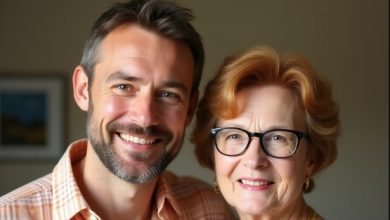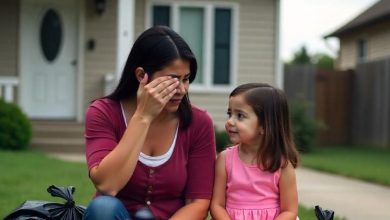Woman gets home and discovers her son doesn’t recognize her.

A cold shiver ran through Helen’s body as she stepped into her own living room and saw her three-year-old little boy, Oliver, stare at her with wide, confused eyes.
“Go away. I want Grandma,” he whispered, backing toward the stairs.
In a single heartbeat Helen’s happy world cracked apart. How could her son look at her and not know her? The answer would turn out to be bigger, stranger, and far more eye-opening than she could have imagined.
A coffee-shop beginning
Do you ever think magic can hide inside ordinary places? Helen never did, not until the morning she met Adam in a small Brooklyn café. She worked there six days a week, pouring drinks, sliding croissants onto plates, and wiping the counter when a splash of latte dotted its shiny surface. On that same day she had thrown her blonde hair into a quick knot, tied the shop’s brown apron around her waist, and hoped for good tips to pay the rent.
At ten-thirty, the doorbell chimed and Adam stepped in. Helen noticed him because of his neat gray coat and his kind smile. He asked for a caramel latte, waited quietly, and when she set the cup down, he didn’t take it right away. Instead, he slid a folded napkin toward her. On the inside were a few words in careful handwriting:
“I come here every morning just to see you.
I think you’re lovely.
May I take you to dinner tonight?
I’ll pick you up after you close—8 p.m.”
Helen felt the blood rush to her cheeks. She knew him as a polite regular, but she had never guessed he might be coming in for more than coffee. She tucked the napkin into her jeans pocket, nodded, and said she would meet him after her shift.
Dinner became laughter, and laughter became dawn. The next morning she woke in his apartment with sunlight on her face, and the two of them never looked back.
Two different worlds, one shared dream
Adam’s life was lined with smooth stones: a family company, smart suits, and dinners where people talked about markets and mergers. Helen’s life was rougher. Her father had died years earlier, her mother was often ill, and college bills had pushed Helen to drop out. She saved every extra dollar for a wish no one else knew about—moving to Los Angeles to chase small modeling jobs. If it failed, she planned to pretend it had only been a vacation.
But once Adam walked in, dreams of Los Angeles faded. He gave her the very things that once only lived in magazines: spa days, designer shoes, and meals where the cheapest bottle of wine cost more than her weekly paycheck. She felt like she had stepped through a door to a new universe.
Six months later Adam bent on one knee in a quiet garden and opened a velvet ring box. An 18-carat diamond sparkled up at her. “Helen,” he said, “will you marry me?” Tears blurred her eyes. She managed to say yes three times before he could even slip the ring on.
They had a barefoot wedding on a Californian beach, the exact shore she used to picture in her mind during night shifts. After the ceremony they traveled to an island resort where the ocean tugged at the sand like a lullaby. When they came home to Brooklyn, reality greeted them with a new surprise—Helen was pregnant.
Motherhood enters the scene
“Honey,” she told Adam, voice shaking, “I’m pregnant, and I don’t know if I’m ready.”
Adam’s grin was huge enough to light the kitchen. “We’re going to be parents! You’ll make the most wonderful mom.”
Helen wanted to believe him. Yet silent doubts crept in: What if I don’t have that natural instinct everyone talks about? What if I mess up? Adam hugged her tight. “We’ll learn together,” he promised.
Nine months later she held a tiny, crying bundle against her chest. The doctor announced it was a boy, and Helen felt the deepest love she had ever known. Adam kissed her forehead and, half laughing, half crying, said, “We need a name that joins us together. How about ‘Hal’—Helen plus Adam?” They settled on Oliver instead, but the idea of joining stayed.
Helen decided to be a full-time mom. She put away the heels, stopped meeting Adam’s upscale friends, and poured her energy into diapers, lullabies, and learning the difference between a hungry cry and a sleepy cry. Adam agreed they did not need a nanny; he wanted their boy raised by family, not strangers.
The quiet change
For three years life stayed soft and small. Then Helen began to notice things. The scar on her stomach from the C-section, the silver lines that trailed across her hips, the circles under her eyes from too little sleep. She still loved Oliver more than air, but she missed something unnamed—dressing up, adult talk, the thrill of people’s admiring glances.
One afternoon she stared at her reflection and felt plain. What if Adam stops loving this version of me? a wicked voice whispered. She tried to ignore it. But the voice grew louder.
Helen called her mother, Claire, and pleaded. “Mom, please move in for a while. Help me with Oliver so I can work out and see friends again. I don’t trust a hired sitter, and Adam wouldn’t like it either.”
Claire hesitated. “Sweetheart, you know my heart isn’t strong, and stairs tire me.”
“I’ll have helpers,” Helen argued. “You can rest when you need to. Oliver will love having you here.”
In the end Claire packed her pills and moved in. Adam barely noticed; he was deep in a new overseas contract. With childcare handled, Helen rushed back into the city scene she once enjoyed—brunches, evening galas, boutique gyms. She swapped her stretched-out sweats for silk blouses, switched water for champagne, and regularly posted filtered photos with hashtags like #MomNightOut.
Suddenly she was glowing again, or so her friends said. At lunch, Cassandra and Bethany squealed over her renewed shine.
“Honestly,” Cassandra said, “I told my husband I would not turn into a house ghost just because we had kids.”
Bethany rolled her eyes. “Motherhood is lovely, but losing yourself? Hard pass.”
They giggled over expensive salads and compared workout classes. Bethany boasted about a cosmetic surgeon who “made miracles” happen. “I’m getting a breast boost next month,” she whispered, tapping her phone to show before-and-after photos. “Maybe a subtle lip fix too.”
Helen laughed it off at first. She believed she was more natural than that. Yet the seed was planted. Weeks passed, and curiosity grew until she booked one “just-to-talk” appointment with the same doctor. He painted glowing images of how small changes could lift her self-esteem. Breast enhancement sounded tempting, and maybe a neat pinch on the nose “for balance.”
A mother’s warning
Claire found the doctor’s brochure under Helen’s pillow. She marched into the kitchen, waving it like a red flag. “Helen, it’s your choice, but these surgeries carry risks. And you’re already beautiful. Adam loves you as you are.”
Helen scoffed. “Mom, honestly, when was the last time a man looked at you? You live on herbal tea and knitting. I’m not ready to watch my husband drift to some flawless supermodel.”
Claire’s face fell, yet she tried again. “You brought Oliver into this world, Helen. He needs you, not a changed version.”
Helen turned away, already dialing the clinic to confirm her procedure.
She also mentioned the idea to Adam, half hoping he would stop her. He was packing for another business trip and only kissed her forehead. “As long as you’re happy. I won’t tell you what to do with your body.”
So the date was set. Claire pleaded once more, no use. Adam flew overseas. Two days later Helen lay under bright lights while doctors marked her skin with blue ink.
When she woke, her chest throbbed, bandages wrapped her from shoulders to ribs, and bruises bloomed purple on her face from cheekbone fillers. The nurse held a mirror; Helen barely recognized the swollen stranger blinking back. It’s just temporary, she told herself.
The child who pulled away
Discharged after two nights, Helen drove home full of painkillers and hope. She pictured Oliver squealing in delight. Instead, the moment she opened the door, her toddler ran behind Claire’s legs.
“M-m-monster,” Oliver whimpered.
Helen froze. “Sweetheart, it’s Mommy.”
“No,” he sobbed. “Mommy is pretty. You’re scary.”
Claire’s worried eyes met Helen’s. “I warned you,” she said softly. “He’s small. Bruises frighten him.”
Helen swallowed hurt. “It’s just until I heal.”
Days turned into weeks. The swelling eased, colors faded, but Oliver still refused her hugs. She tried everything: singing his bedtime song, offering chocolate chip pancakes, showing photos of the day he was born. He clung to Claire and shook his head.
Late at night Helen cried into her pillow. The very changes meant to secure her family had pushed her son away.
Secrets uncovered
One bright afternoon Helen sat on the back porch reading. Oliver toddled up with a yellow dandelion. “For Mommy,” he chirped. Joy soared inside her. She reached out, but then he frowned. “Oops,” he whispered. “Game over.”
“What game?” Helen asked.
“Grandma’s game,” Oliver said. “She said pretend you’re not Mommy. If I play, I get new toys!”
Shock flashed through Helen. Her own mother had told her child to deny her? Fury bubbled. She marched inside. “Mom, how could you?”
Claire’s shoulders sagged. “I did it for you. I hoped if Oliver’s reaction hurt you, you would cancel the next procedures. I was terrified of losing my real daughter under layers of surgery.”
Helen’s voice trembled. “Manipulating a three-year-old? That’s cruel.”
“Cruel is watching you slice yourself up because you think you’re not enough,” Claire replied, tears running down her cheeks.
At that moment the front door clicked. Adam rolled in, suitcase in hand. He scanned the tense scene, the fading bruises on Helen’s face, and the guilt in Claire’s eyes. “What happened?”
The story poured out: the surgeries, Oliver’s pretend game, Claire’s desperate plan. Adam listened. Finally he said, “Helen, I never loved you for a perfect face. I fell for the girl behind a coffee counter who snorted when she laughed and smelled like cinnamon foam. I love your kindness, your jokes, the way you hum while chopping onions. I’m scared you don’t see how amazing you already are.”
Helen’s anger melted into shame. She looked at Oliver playing with toy cars on the rug and realized none of this was worth risking his trust.
Turning the page
The next morning Helen called the clinic and canceled every future appointment. She donated three bags of designer dresses to Charity Link and signed up for a parenting class instead of a Pilates studio. She apologized to Claire for her harsh words, and mother and daughter agreed honesty was better than tricks.
With slow patience she rebuilt her bond with Oliver—finger painting, park swings, bedtime stories where the hero was a brave little boy and his mother. One night he curled beside her and whispered, “You smell like Mommy again.” Helen held him until his breathing deepened.
In time, she also found a middle road: twice a month she met friends for coffee, not champagne. She jogged around the block, not to shrink herself but to feel her heart beat strong. When she glanced in the mirror she saw laughter lines and felt proud; they proved she was alive and loving.
Lessons shining through
This story reminds us that real love does not depend on how closely we match a magazine cover. It lives in shared jokes, late-night talks, and the gentle way someone fastens your coat when wind blows cold. Changing our outside appearance can be fun, but if it is driven by fear, it may steal more than it adds. Children especially need the comfort of a face they trust, not a perfect face.
It also teaches that good intentions can still cause harm. Claire was afraid for her daughter’s health, yet using Oliver as a tool wounded everyone. Honest words—even hard ones—offer a cleaner path than secret games.
Finally, the story shows that self-worth must grow inside, not rely on the gaze of others. Helen learned to find value in her patience, humor, and courage. And once she believed in those things, she no longer needed stitches or silicone to feel beautiful.
May we all remember: the heart sees further than the eyes, and the people who truly love us already think we are enough.



